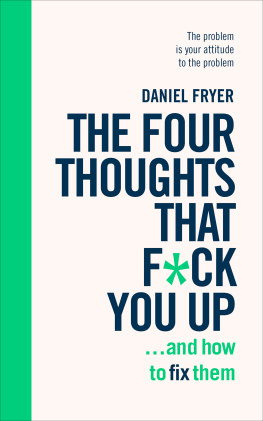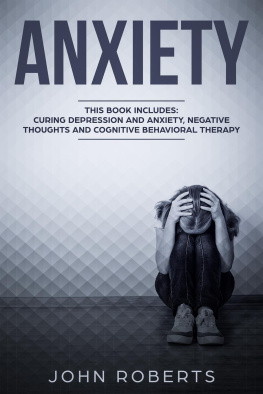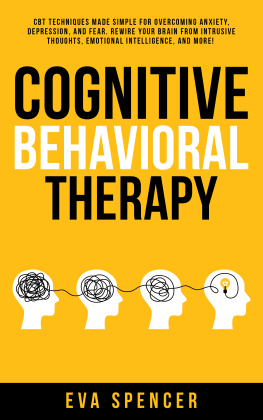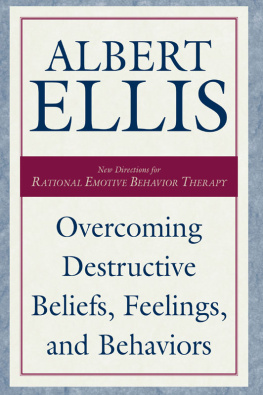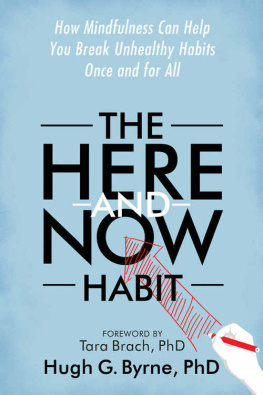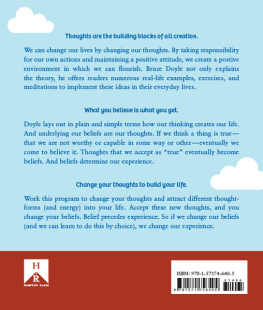
Daniel Fryer
THE FOUR THOUGHTS THAT FCK YOU UP AND HOW TO FIX THEM
Rewire how you think in six weeks with REBT

Any references to writing in this book refer to the original printed version. Readers should write on a separate piece of paper in these instances.
Contents
About the Author
Highly experienced and sought after REBT psychotherapist Daniel Fryer is a former journalist with an MSc in rational-emotive and cognitive behaviour therapy, a diploma in clinical hypnosis and another in cognitive behavioural hypnotherapy. A therapist since 2004; he works for The Priory Hospital in Bristol, runs his own private clinic (also in Bristol) and is a consultant at the occupational health division of a private health care company. Prior to this, he was based full-time in London (he moved to Bristol in 2016). He worked as a specialist for ten years at the Royal Brompton Hospital, treating psychogenic pain conditions, and ran two successful London-based practices. He has lectured on college courses, developed specialist workshops, and gives regular talks on mental health and wellbeing topics.
For my Mum
infamy, of sorts
An Introduction
The happiness of your life depends upon the quality of your thoughts.
Marcus Aurelius
People that meet me think me very calm and placid, unflappable even. People that know me remember the short-tempered and impatient little grumpus that I was before I ever studied and practised psychotherapy, especially one form of psychotherapy in particular.
Very, very few people that remember me as that grumpus know that I once raced in my car after a motorist I had just given way to, cut them up, forced them to a standstill in the middle of the road, and then ran up to their car and, hammering heavily on the drivers side window, screamed at them very loudly, The next time someone lets you pass, you say thank you!
The driver nodded vigorously in terrified acquiescence and so I walked back to my car, got in and drove away calmly, albeit with a thumping headache from my angry outburst.
It was not my finest moment.
In my defence, they were the third such motorist that I had given way to on the same long, narrow stretch of road, and I was feeling more than a little aggrieved. But, that was a long time ago and, thankfully, that excellent form of therapy has stood me in good stead, guiding me through many frustrating situations over the years.
I first came to Rational Emotive Behaviour Therapy (REBT) in 2005. Perhaps unsurprisingly, I learnt about it on a course I was studying (me being a practising therapist and all).
Before that, I worked in journalism and publishing, so I really do know a thing or two about stress, pressure and deadlines. Far more than was probably healthy at the time. I thought therapy would be more fulfilling for me. Surprisingly, it was. I also used to work in London (stressful) and then moved to Bristol a few years ago (not-so-stressful). Somewhere along the line I acquired a dog. Shes a Staffy; a rescue from Battersea Dogs and Cats Home, and I accidentally turned her into a working therapy dog. And a famous one at that. She has appeared in articles and features of her own. She plays it down but, secretly, I think she enjoys all the attention.
But back then, Id been working as a hypnotherapist for a little over a year and I wanted to build on and consolidate my learning. REBT is a very structured and goal-orientated form of psychotherapy that looks at challenging your disturbing thoughts about any given situation and replacing them with more helpful alternatives. Solution-focused and practical, it looks at where you are and where you want to be and then gives you the tools to help get you there.
The tutors on the course were practising therapists themselves. Each week they would explain a different aspect of the therapy and explore a different topic. They would often ask for volunteers from the class to come up to the front and aid them in demonstrating various aspects and practices of the therapy.
Pick a real problem to work through, the tutors would say. Not only will you be able to focus on your own personal development, but youll be able to experience first-hand just how effective this particular form of therapy is.
But the volunteers never offered up any real problems. They were too nervous. They made their problems up, or they offered pseudo-problems; they even role-played other peoples problems. You could tell.
One day, a student offered himself up for demonstration purposes; there he sat at the front of the class as the tutor asked him what he would like to work on.
Well, he said slowly, staring off into the middle distance and clearly reflecting deeply on exactly what it was that he wanted to volunteer. I dont always clean my fish tank out on time and Id like to know why.
The audience groaned and the tutor exclaimed, Oh for gods sake! No one is ever going to pay you good money to work on that as a problem. Has anyone got any actual problems they want to work on?
Tentatively, my hand went up.
What have you got for me? said tutor enquired.
An anger-management issue, said I.
The tutors face lit up with glee. What is it? he asked, as twenty pairs of student eyeballs zeroed in on me.
I dont like crowded places, I said. I dont like traffic jams or rush hours. I dont like people that cut me up, either on foot or in cars. I dont like crowded train platforms or crowded trains, I dont like shopping malls or concert halls, and I dont like football matches or festivals. I dont even like people who walk too slowly. Basically, I dont like anywhere and everywhere a large amount of people gather, either to go in, or congregate in, or leave.
And what makes you think this is an unhealthy anger-management problem rather than just, say, normal frustration? he asked.
Well, I said, my face reddening a little, I mutter under my breath a lot. I can shout and swear at people a whole lot, and I will often growl at people like a bear. If Im really angry, I will physically grab them and shove them out of my way and, if Im really, really angry, I will do all of the above.
Hot damn, he said. Thats anger. Please come up to the front.
He asked me a few more questions about my crowded places anger-management issue and, in a very short space of time, managed to deduce exactly what it was that I was getting angry about. From there, using the tools and techniques of REBT, he worked out the four thoughts that were fucking me up very quickly indeed.
I worked on those thoughts continuously over the duration of the course and, to the relief of crowds of people everywhere, I never, ever muttered, shouted, swore, growled, grabbed or hammered on car windows again.
But, what exactly is Rational Emotive Behaviour Therapy, what does it achieve, and how can it help you think, feel and act in a more appropriate way?
In a slight case of acronym overkill, REBT is a form of Cognitive Behaviour Therapy (CBT) that takes a simple-yet-cunning approach to mental wellness, where Activating events (A) trigger Beliefs (B) that cause Consequences (C). You Dispute (D) your beliefs vigorously and repeatedly, which leads to an Effective rational outlook (E) to that original activating event. This is known as the ABCDE model of psychological health, and Ill be explaining it in greater detail later on.
This model allows you to identify and challenge unhealthy thoughts that are triggering unhelpful emotions and behaviours while, at the same time, helping you to formulate and reinforce a series of more healthy thoughts that will trigger more helpful emotions and behaviours.
Next page
